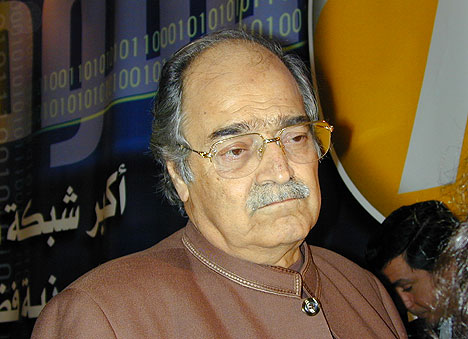|
|
register now
for site updates
(type your email here)
|
|
|
|
|
|

|
|
|

|
|
|
|
|
| |
Not the government's job

Dispatch
Filed by Tarek Atia
March 12, 2001
At the launch of the new Arabic pay-TV scheme "Al-Awael" in Cairo on Sunday, Arab Radio and Television (ART) founder Sheikh Saleh Kamel, a prominent Saudi Arabian businessman, reaffirmed some of his most controversial statements regarding the future of television in the region. The new system, distributed by Kamel's TV platform management company, Arab Digital Distribution (ADD), combines ART's 7 channels with a wide variety of Arabic and Western channels, in an attempt to capture the largest share in the ever-growing pay-TV market region-wide.
Al-Awael's heady mix of news and entertainment channels is also heavily tilted towards sports, including channels like Eurosport (which will be scrambled in the Middle East for the first time, meaning those who used to get it for free via satellite will not be able to without getting the "Al-Awael" decoder) and Manchester United TV, in addition to a specialized Egyptian sports channel and two specialized ART sports channels.
"Sports is the spinal cord of the whole operation," Kamel told Sunday's press conference. It is also the main point of contention in a region where millions religiously watch soccer games whenever they're on TV.
The Saudi media mogul has been changing the equation bit by bit ever since his ART channels have been buying the exclusive rights to broadcast premium sporting matches in the region. The high point of ART's hegemony in this domain came a few years ago, when Egypt was playing Saudi Arabia in an important semifinal match in the African Cup. The big match was only showing on pay-TV ART, a phenomenon which resulted in much nay-saying in the press and amongst the general public about how it is every citizen's right to watch premium sporting matches for free.
At the time, Egyptian television could not afford to purchase the rights to the game, and was highly criticized as a result. The bottom line for state-owned TV is that the ads aren't covering the costs of obtaining the rights to premium sports contests, meaning major tournaments like the World Cup probably won't be in the offing.
That's where Kamel and ART come in.
At the press conference, Kamel said he had ambitions to obtain the exclusive rights of every single major tournament and sporting event in the region -- maybe even local championships and club league play. Kamel argued vehemently about it not being the government's job to provide citizens with premium matches for free. "If we don't give the poor free bread," he said, "why should we give them free premium matches?"
The argument on the other side of the coin is that the matches are one of the only remaining entertainment options for a vast majority of the low-income population, and that even that fleeting joy would disappear if Kamel's vision comes true.
At the same time, however, the state-owned media apparatus is between a rock and a hard place, bound to run into trouble even if they try to operate the way Kamel does. When ART bought the rights to the Cup that featured the controversial Egypt-Saudi game, everything worked out fine for the network, investment-wise. Last time, Kamel said, "we got shafted, because there were no Arab teams playing."
"Basically, you have to buy early and take risks. Governments can't do that. They'll be in big trouble with the public and the press if they've spent all that money and then their team doesn't make it."
Kamel has spent some $1.3 billion on his media holdings, which include ART, ADD, and AMD, which owns the negatives to a huge collection of Arabic films as well as a music production company. Many of these ventures have yet to turn a profit.
Much hope is being pinned on the group's new pay-TV distribution scheme, which was implemented as a result of marketing studies that showed that Arab families want Western programming, news, and Indian movies, along with their Arabic soap operas, etc. Kamel thinks the LE69 price for the basic bouquet which includes 16 channels (and up to LE199 for the full range of 36 channels) is reasonable for even the lower class household budget, arguing that it amounts to only a couple of pounds per day, which would have been spent on renting cartoon videos for the kids, or going out to sports events and plays.
Starting April 1, Al-Awael will replace the standard ART bouquet in markets worldwide.
Did you like this article? Send your comments to comments@cairolive.com
|
|
|